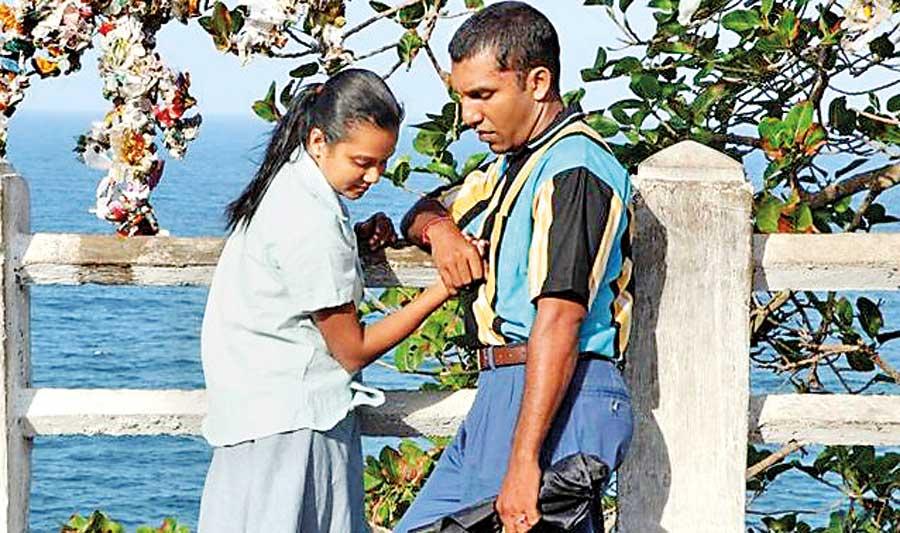Reply To:
Name - Reply Comment

A still from the film ‘Flying Fish’, which was banned by the Government
Films in Sri Lanka have not only nudged the audience, but pinched past governments when the rulers were exposed. On Friday (February 4) Sri Lanka celebrates 74 years after receiving independence from the British. But when we look back we have questions to pose about whether this independence has been enjoyed by lawmakers only or not the citizens and people involved in the creative industry; like the Sri Lankan cinema. Just a few days ago the island celebrated 75 years in the filmmaking industry. There is always fancy talk and adulation showered by the authorities using the media when someone or something reaches a milestone. But the lawmakers were not heard saying much when the film industry counted 75 years in existence just the other day. How can they when as many as five top cinematic productions were banned for nonsensical reasons.
exposed. On Friday (February 4) Sri Lanka celebrates 74 years after receiving independence from the British. But when we look back we have questions to pose about whether this independence has been enjoyed by lawmakers only or not the citizens and people involved in the creative industry; like the Sri Lankan cinema. Just a few days ago the island celebrated 75 years in the filmmaking industry. There is always fancy talk and adulation showered by the authorities using the media when someone or something reaches a milestone. But the lawmakers were not heard saying much when the film industry counted 75 years in existence just the other day. How can they when as many as five top cinematic productions were banned for nonsensical reasons.
The five top films that faced the axe were Nalangana (1960), Dutugemunu (1979), The Judgement (1998), Akshanraya (2005) and Flying Fish (2011). When considering the reasons given and not given for such a decision by the government what emerges as the yardstick for a production to be slapped with a ban is that the film was ‘not appropriate’ given the time it was released.
 A good example for this is the film ‘The Judgment’ where one of Sri Lanka’s leading artistes Gamini Fonseka was to play the lead role as a retired Army General who was invited to govern the country. The year was 1998 and the country was at the height of a civil war at that time where government security forces were engaged in a bloody battle to crush a rebellion by Tamil tiger separatists. The then defence ministry made it known that the reason for the ban was that the film was touching on issues that were not appropriate at that time. The plot was one that showed how a retired Army General was approached by a group of people because a country had lost faith in the political parties in existence. The ex-Brigadier becomes the head of the country and as the years roll on he becomes a dictator; this causes his downfall. The film was-according to newspaper reports- shut down at the initial stages of production. When looking back at the plot of the film we can draw parallels with the present regime that is in power and one that existed when the ‘Greens’ were in power.
A good example for this is the film ‘The Judgment’ where one of Sri Lanka’s leading artistes Gamini Fonseka was to play the lead role as a retired Army General who was invited to govern the country. The year was 1998 and the country was at the height of a civil war at that time where government security forces were engaged in a bloody battle to crush a rebellion by Tamil tiger separatists. The then defence ministry made it known that the reason for the ban was that the film was touching on issues that were not appropriate at that time. The plot was one that showed how a retired Army General was approached by a group of people because a country had lost faith in the political parties in existence. The ex-Brigadier becomes the head of the country and as the years roll on he becomes a dictator; this causes his downfall. The film was-according to newspaper reports- shut down at the initial stages of production. When looking back at the plot of the film we can draw parallels with the present regime that is in power and one that existed when the ‘Greens’ were in power.
Civil war a hot subject
The civil war that existed for close to 30 years was a hot subject used by politicians in Sri Lanka and lawmakers abroad to pursue their agendas; hence it being such a sensitive topic even for discussion.
Another film director who had to face the axe of the censor was Jude Ratnam who was instrumental in making and releasing the film ‘Demons in Paradise’. When all was set for the film to be shown at the Jaffna International Film Festival 2018 he was informed by the festival’s organisers that his production would not be given its allotted slot because of pressure coming from a group which called themselves the ‘community’. Ratnam is critical of both the parties which were at war. Independent critics rated the movie as balanced and for the message it sent to other countries grappling with the issue labelled in a myriad of names like ‘the question of the other’, ‘the outsider’ and ‘foreigner’. This documentary about the war is also rated as the first of its kind to be made by an insider and for the production to come from outside the island.
Most of our artistes who appear on the silver screen are also involved in stage dramas. Hence the ‘stage’ or theatre was also a tool used by independent directors to send a strong message to the government and the public. We cannot forget the stage drama titled ‘Eka Adhipathi’ which was directed by Dharmasiri Bandaranayake. He also directed the drama ‘Trojan Kanathawo’ which served as an anti-war statement. The content in the drama proved to be controversial with one of the past governments. However the drama received critical acclaim, despite being coming under the watchful eyes of the state. Bandaranayake later received death threats when he attempted to show the drama in predominantly Tamil areas.
Sometimes critics can point out that making a film on an ongoing war can have negative repercussions on the government security forces. The problem with the civil war-fought between 1983 and 2009- was that it was mostly covered by the media arm of the state. Hence a door was left open for independence thinkers and filmmakers to do their investigations and bring out hidden truths about the war that were not reported on. When what’s made by these independent filmmakers and drama directors-even during the postwar period- doesn’t tally with the view of the government the ‘conflict’ starts. ‘Flying Fish’-made in 2011- was one film that didn’t receive government approval. The film has an unflinching look at the civil war, but despite all the promise as a production well made, and covering such a sensitive subject, it was banned by the authorities who found fault with the film for using images of the Sri Lanka Army sans approval. The producer of the film-Sanjeewa Pushpakumara- denied these charges. Generally when the filmmaker of such a film living in the country he or she would have to face the wrath of the government. But in Pushpakumara’s case he was residing in South Korea and released a statement regarding the criticism directed at him. Pushpakumara said that he never wanted to discredit the security forces and only wished to ‘depict reality in a humane and artistic manner’.
Leave alone the war. There have been times when filmmakers have been ‘throttled’ when they have been critical of the government using topics outside the civil war in their productions. One such production was ‘Dutugemunu’ (1979) which has a scene where an elephant is seen thrown away. This part of the film was seen as criticism being aimed at the government. The film ‘Aksharaya’ saw its approval being revoked. This was because it was alleged that the film’s contents were bringing the judiciary into disrepute.
The first real blow to Sri Lankan cinema came in the year 1960 when the film ‘Nalangana’ was banned after the authorities termed it ‘a national disaster’. This was because some scenes in the film were rated as obscene. This is a film where the sound tracks gave us some unforgettable songs like ‘Parama Ramani’ and ‘Giluna Soka Gangey’. Like in an obscene scene from a film-where criticism is stirred because clothes do come off during intimacy-a government and it’s questionable work are exposed when a film producer digs in and makes a movie in a manner in which the attire of the regime is made to fall off.
We are in an era where films are made by independent filmmakers and governments have to live with the fact that films will be made whether they like it or not. Social media is a happening outlet and film producers don’t have to wait in the queue for their productions to be approved by the Public Performance Board any more.